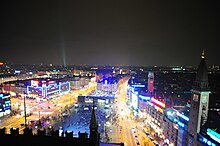Portal:Business
The Business and Economics Portal Business is the practice of making one's living or making money by producing or buying and selling products (such as goods and services). It is also "any activity or enterprise entered into for profit." A business entity is not necessarily separate from the owner and the creditors can hold the owner liable for debts the business has acquired. The taxation system for businesses is different from that of the corporates. A business structure does not allow for corporate tax rates. The proprietor is personally taxed on all income from the business. A distinction is made in law and public offices between the term business and a company such as a corporation or cooperative. Colloquially, the terms are used interchangeably. (Full article...) Economics (/ˌɛkəˈnɒmɪks, ˌiːkə-/) is a social science that studies the production, distribution, and consumption of goods and services. Economics focuses on the behaviour and interactions of economic agents and how economies work. Microeconomics analyses what's viewed as basic elements in the economy, including individual agents and markets, their interactions, and the outcomes of interactions. Individual agents may include, for example, households, firms, buyers, and sellers. Macroeconomics analyses the economy as a system where production, distribution, consumption, savings, and investment expenditure interact, and factors affecting it: factors of production, such as labour, capital, land, and enterprise, inflation, economic growth, and public policies that have impact on these elements. (Full article...) Selected article The London Necropolis Company (LNC), formally the London Necropolis & National Mausoleum Company until 1927, was a cemetery operator established by Act of Parliament in 1852 in reaction to the crisis caused by the closure of London's graveyards in 1851. The LNC intended to establish a single cemetery large enough to accommodate all of London's future burials in perpetuity. The company's founders recognised that the recently invented technology of the railway provided the ability to conduct burials far from populated areas, mitigating concerns over public health risks from living near burial sites. Accordingly, the company bought a very large tract of land in Brookwood, Surrey, around 25 miles (40 km) from London, and converted a portion of it into Brookwood Cemetery. A dedicated railway line, the London Necropolis Railway, linked the new cemetery to the city. Financial mismanagement and internal disputes led to delays in the project. By the time Brookwood Cemetery opened in late 1854, a number of other cemeteries had opened nearer to London or were in the process of opening. While some parishes in London did arrange for the LNC to handle the burials of their dead, many preferred to use nearer cemeteries. The LNC had anticipated handling between 10,000 and 50,000 burials per year, but the number never rose above 4,100 per year, and in its first 150 years of operations only 231,730 burials had been conducted. Buying the land for Brookwood Cemetery and building the cemetery and railway had been very expensive, and by the time the cemetery opened the LNC was already on the verge of bankruptcy. The LNC remained solvent by selling surplus parts of its land, but as the land had been chosen for its remoteness, sales were low. Selected image
Selected economyThe economy of Denmark is a modern high-income and highly developed mixed economy. The economy of Denmark is dominated by the service sector with 80% of all jobs, whereas about 11% of all employees work in manufacturing and 2% in agriculture. The nominal gross national income per capita was the ninth-highest in the world at $68,827 in 2023. Correcting for purchasing power, per capita income was Int$57,781 or 10th-highest globally. The income distribution is relatively equal but inequality has somewhat increased during the last decades. In 2017, Denmark had the seventh-lowest Gini coefficient (a measure of economic inequality) of the then 28 European Union countries. With 5,932,654 inhabitants (1 January 2023), Denmark has the 38th largest national economy in the world measured by nominal gross domestic product (GDP), and the 52nd largest in the world measured by purchasing power parity (PPP). (Full article...) Selected quoteAt this point in the inquiry relation had established itself between the "interview programme" and the results obtained in the experimental rooms. The source of those constraints, relief from which the relay assemblers had so freely expressed, had, at least in part, revealed itself. Human collaboration in work, in primitive and developed societies, has always depended for its perpetuation upon the evolution of a non-logical social code which regulates the relations between persons and their attitudes to one another. Insistence upon a merely economic logic of production-especially if the logic is frequently changed-interferes with the development of such a code and consequently give rise in the group to a sense of human defeat. This human defeat results in the formation of a social code at a lower level and in opposition to the economic logic. One of its symptoms is "restriction". In its devious road to this enlightenment, the research division had learned something of the personal exasperation caused by a continual experience of incomprehension and futility. It had also learned how serious a consequence such experience carries for industry and for the individual.
TopicsRelated WikiProjectsDid you know (auto-generated) -
On this day in business history
General imagesThe following are images from various business-related articles on Wikipedia.
More did you know
Business news Wikinews Economy and business portal
|






































